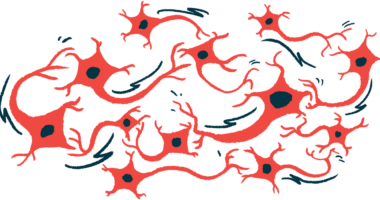
Experimental treatments for ALS
AstroRX
AstroRx is a stem cell therapy comprised of fully matured human astrocytes derived from human embryonic stem cells, given by intrathecal (into the fluid surrounding the spinal cord) injection to support damaged motor neurons. Treatment is aimed at compensating for the malfunctioning astrocytes and help to prevent the loss of motor neurons, slowing ALS progression. The potential therapy has completed a Phase 1/2 trial.
Cannabis
Cannabis-derived products are being evaluated for their potential in treating ALS in various clinical trials. The active ingredients in cannabis — tetrahydrocannabinol (THC) and cannabidiol (CBD) — are called cannabinoids. They are believed to work as antioxidants and as anti-inflammatory and neuroprotective agents and thus might be able to slow or prevent further damage to nerve cells in ALS.
CNM-Au8
CNM-Au8 is an experimental therapy being developed to treat patients with ALS, Parkinson’s disease, and multiple sclerosis. It contains a suspension of nanocrystalline gold that acts to support biological reactions within cells that generate energy, as well as help remove the destructive byproducts of cellular metabolism. Preclinical studies have demonstrated that CNM-Au8 is able to protect motor neurons from severe damage and death. It is being studied in Phase 2 trials.
CNS10-NPC-GDNF
CNS10-NPC-GDNF is an experimental stem cell-based therapy that is being developed by researchers at Cedars-Sinai Medical Center in Los Angeles to potentially slow disease progression and extend survival in people with ALS. It is given surgically into precise regions in the spinal cord or brain.
Engensis
Engensis is an investigational gene therapy designed to slow disease progression in people with ALS. It is being developed by Helixmith to be given via regular injections into muscle, or intramuscular injections.
IPL344
IPL344 is an experimental treatment being developed to slow ALS progression. IPL344 is a molecule that researchers designed to activate the Akt signaling pathway, which plays a role in the survival of cells. Studies have shown that the activity of the Akt pathway is reduced in patients with ALS. By activating the pathway, researchers think IPL344 may help protect nerve cells and slow the progression of the disease. A Phase 1 trial is currently recruiting ALS patients.
Masitinib
Masitinib is an oral medication that’s being developed as a potential add-on treatment for slowing disease progression in people with ALS. Its developer, AB Science, is running a confirmatory Phase 3 trial to support future applications to regulatory agencies.
MN-166
MN-166 (ibudilast) is an experimental oral therapy that’s designed to reduce inflammation and protect nerve cells from damage in people with ALS. Developed by MediciNova, it’s expected to slow disease progression.
NurOwn
NurOwn (debamestrocel) is an investigational cell-based therapy designed to slow disease progression and potentially extend survival in people with ALS. It is being developed by BrainStorm Cell Therapeutics to be given as regular intrathecal injections, or into the spinal canal.
Pridopidine
Pridopidine is an investigational sigma-1 receptor agonist for ALS treatment. It is a small molecule that binds to the sigma-1 receptor on nerve and glial cells, which are the cells that support nerve cells. Scientists think that the sigma-1 receptor may play a role in protecting the nervous system against neurodegenerative diseases, including ALS. A Phase 2/3 trial is currently enrolling by invitation.
Tegoprubart
Tegoprubart is an antibody-based therapy designed to suppress neuroinflammation by preventing the interaction of two molecules — the CD40 ligand (CD40L) and its receptor — at the surface of multiple types of immune cells. This pathway is overactive in ALS patients and can contribute to inflammatory nerve damage. A Phase 2 trial investigating tegoprubart is now complete.
Tregs
Cell therapy using regulatory T-cells (Tregs) has shown promise in suppressing inflammation and slowing the progression of ALS. Scientists think there is an inverse link between levels of Tregs and the rate of ALS progression. This suggests that enhancing the Tregs level in people with ALS could delay the disease’s progression. The potential therapy is being investigated in a number of trials.
TUDCA
TUDCA (tauroursodeoxycholic acid) is a small molecule that may be able to decrease nerve cell death, a hallmark of ALS, through its ability to act as an antioxidant that prevents toxic reactive oxygen species from accumulating inside cells. The molecule also has the ability to control immune function. It is currently being studied as an add-on treatment in Phase 2 and 3 trials.
Ultomiris
Ultomiris contains an antibody that is injected into the bloodstream and that inhibits a protein called C5, a member of the complement system, which is thought to be implicated in neurodegeneration in ALS. By inhibiting C5, Ultomiris interrupts the overreaction of the complement system, potentially slowing ALS progression. It is currently being tested in Phase 3 trials in ALS patients.




